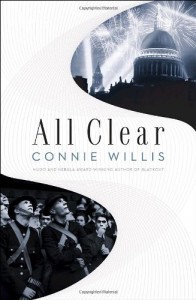All Clear, by Connie Willis
 The most controversial and problematic aspect to Blackout, by Connie Willis, was the chosen publishing format. By slicing one major novel in half, and publishing them six months apart, even the most loyal fans of the author were challenged by the existence of a novel that made no narrative or structural sense, and stopped just as the story was really kicking into gear.
The most controversial and problematic aspect to Blackout, by Connie Willis, was the chosen publishing format. By slicing one major novel in half, and publishing them six months apart, even the most loyal fans of the author were challenged by the existence of a novel that made no narrative or structural sense, and stopped just as the story was really kicking into gear.
Now, finally, with the release of All Clear, we can treat this book (Blackout/All Clear as I hope it will appear on all the awards shortlists) as it should be treated: a single, sprawling epic about time travel and the Blitz which is, quite simply, Connie Willis's masterwork.
Willis has been writing around this book for most of her career. Her previous time travel novels The Doomsday Book and To Say Nothing of the Dog introduced readers to several key characters who appear in this story as well as her rules for time travel: the Oxford history department, the nets, the slippage. In these as well as stories such as "Jack" and "Fire Watch," Willis' obsession with the Blitz rang true, and it seems a little bewildering to look back and realise that she had not, before now, written a full novel centred around this era.
But I am in danger of repeating myself. I already reviewed Blackout back in February. The important point is that All Clear is brilliant. I was lucky enough to secure a review copy early enough that all the build up and characterisation of Blackout was still clear in my head when I started the second volume, and I can tell you that it hits the ground running.
If Blackout is the child of Fire Watch and To Say Nothing of the Dog, then All Clear is the child of The Doomsday Book. Where Blackout was about the social detail of living in wartorn Britain, All Clear is about the devastation that the war wrought on the country. It is bombs and tears and Dunkirk spirit and death and loss and eternal friendship.
Most of all, it's about finding lost time travellers, when all the traditional means are ripped away from you, in a time long before the information revolution. It's a shame in many ways that Willis began creating her future of time travellers long before mobile phones and emails and Twitter, because if those details had been more firmly cemented into the world that our protagonists come from, then the lack of information during the Blitz would be more starkly horrifying. That contrast is there, though, if not quite so active within the text, because we as readers bring those presumptions in.
The most powerful aspect of Blackout is that we only see the events through the eyes of those three stranded time travellers, with no idea what has happened to the future they take for granted. The power of All Clear is that we the readers discover that truth, and yet remain utterly lost, unsure whether there will be a rescue, and certain that not everyone is going to make it back in one piece. Having built up this world and time travel rules and hung so many classic works upon it, I was not quite prepared for Willis to take that world apart as thoroughly as she does, to break all of her rules, and to show that in fact the time travellers and their team of smug researchers back in Oxford had it wrong all along.
Nothing is what it seems.
I suspected from Blackout that this book would turn out to be a Willis classic, one of my favourites of hers. But the similarities to the jovial To Say Nothing of the Dog in the first volume were thoroughly misleading. Like The Doomsday Book and Passage, this one is a heartbreaker. I cried great big buckety sobs over it, as each character found their fate and their future. Some tears of happiness, some of genuine grief. The cleverest narrative thread, the one about a character hardly named that was sneakily woven into Blackout, pays off in spades, and the whole tapestry of the book turns out to be brilliant and thought-provoking and completely worth the hassle of buying it in two separate volumes.
I don't think Willis is coming back to her time travellers again. This is it. If you have ever loved her work, you need this book.



